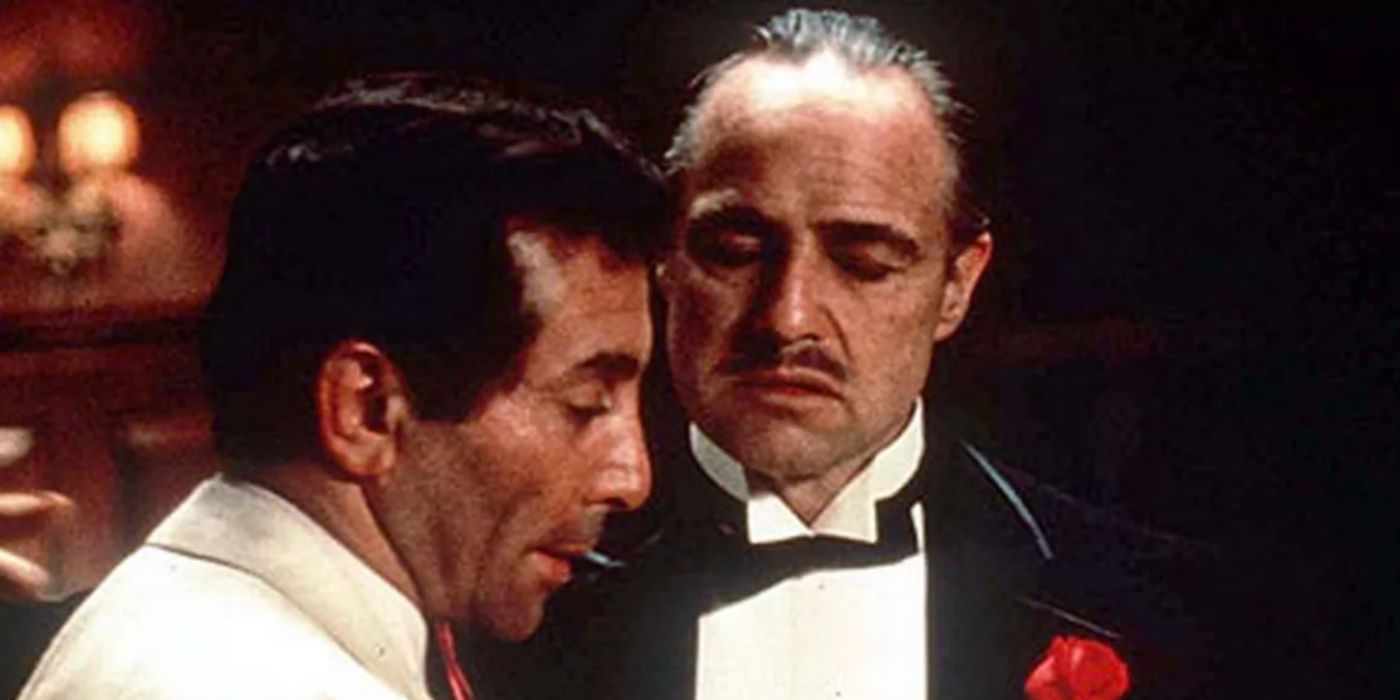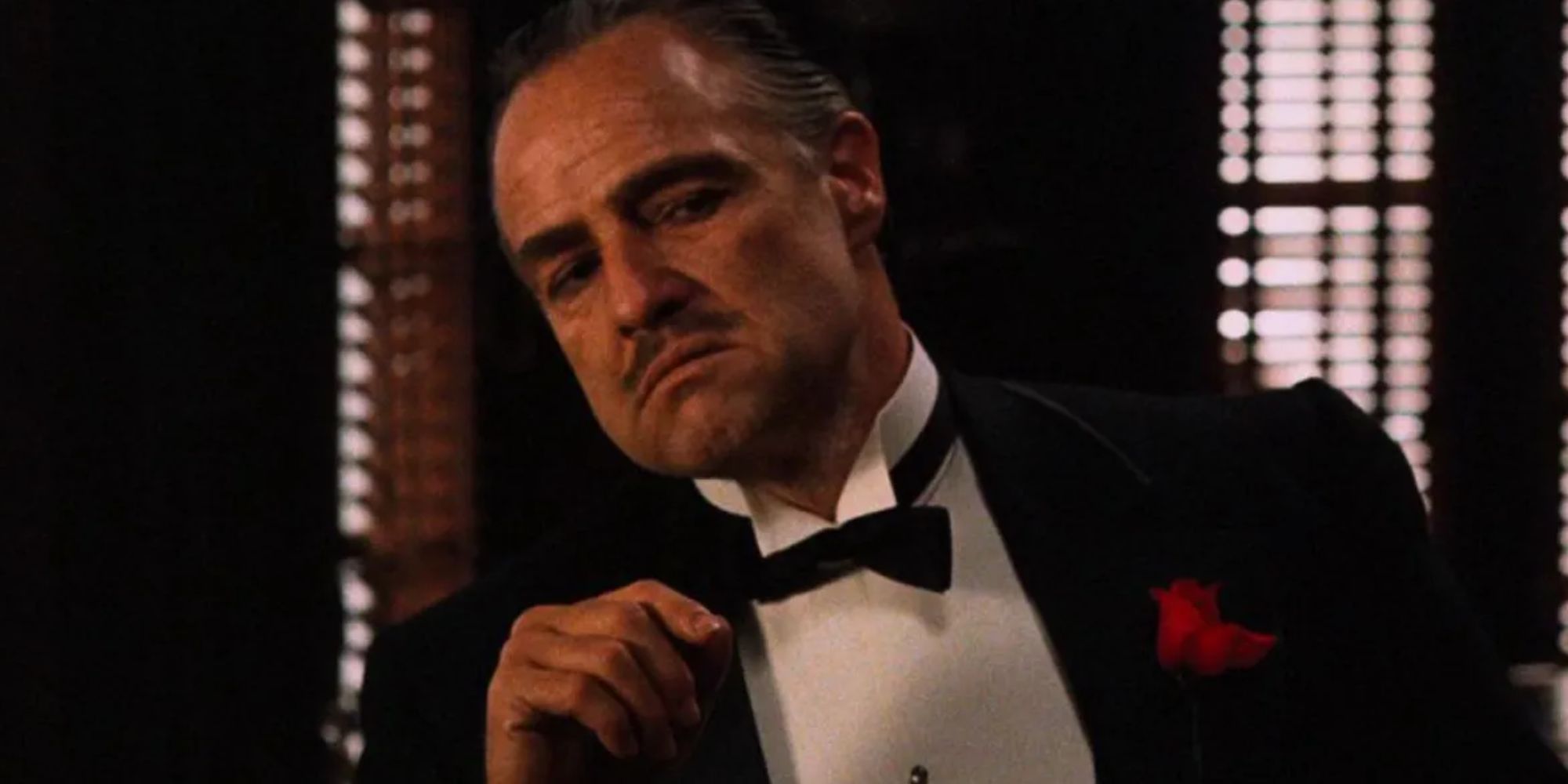The Big Picture
- The Godfather‘s production was filled with drama and conflicts, from battles between Coppola and Paramount to involvement with the real-life mafia.
- Initially, Coppola was resistant to directing The Godfather because he viewed it as a trashy paperback with limited artistic value, but he realized playing the game was necessary to get his passion projects on screen.
- Sergio Leone was offered the chance to direct The Godfather but declined due to his dislike of the script’s treatment of mafia subjects and his possession of a mafia epic he intended to adapt.
In the early stages of one’s emergence as a cinephile, you are aware of The Godfather‘s shining prestigiousness. You are informed that it is one of the finest films ever put to celluloid. Impressively, after all the pomp and circumstance surrounding its legacy, the film lives up to the fanfare. The performances by Marlon Brando, Al Pacino, and James Caan, and the exquisite direction by Francis Ford Coppola linger with the viewer forever. Coppola’s remarkable achievement as a filmmaker crystallized the power of what is capable of a film director. Despite The Godfather being a definitive film of Coppola and the medium itself, an entirely different director, Sergio Leone, almost carried out the on-screen adaptation of Mario Puzo‘s novel.
‘The Godfather’ Had an Infamously Messy Production
The tumultuous production of The Godfather, from the constant creative battles between Coppola and Paramount head Robert Evans, who staunchly disapproved of Pacino’s casting, to the involvement of the real-life mafia, is a gripping saga on its own, as depicted in the Paramount Plus miniseries, The Offer. The behind-the-scenes drama of this film, and just about every auteur-driven project of the 1970s has been well documented. A facet of The Godfather‘s making-of story that deserves more recognition is that, initially, Coppola was resistant to directing the film. Since it was viewed as a trashy paperback bestseller with limited artistic value, the director saw this opportunity as a creative step-down.
More importantly, The Godfather was not conceived by him, thus counteracting his greater mission as a storyteller of original ideas. However, Coppola realized that playing the game of Hollywood was an essential task to getting his passion projects on the big screen. As he describes it as a guest on The Howard Stern Show, his Italian-American heritage was an enticing draw for the studio, in addition to his success as a screenwriter, as he recently won an Oscar for his script for Patton.
Sergio Leone Was Offered the Chance To Direct ‘The Godfather’
For all of Paramount’s doubts and apprehensions surrounding Coppola’s vision, from the start, they adopted a mindset of hiring a director with Italian roots to succinctly capture the authenticity of the nation’s sweet and delicate culture juxtaposed with the ruthless underworld practices of the Corleone family. Before landing on Coppola, the studio had its eyes on the great Italian director and seminal visionary of Westerns, Sergio Leone. Synonymous with the Spaghetti Western, Leone is best known for his Dollars Trilogy starring Clint Eastwood. While only directing a handful of films, all of them are masterworks in their own right, juggling grimy pulp sensibilities with austere depictions of the pathos of violence and capitalism. In other words, Leone’s cinematic expertise made him an ideal candidate to elevate the trashy core of The Godfather into an operatic tale of family.
For Leone, a chance to direct The Godfather was an offer he could refuse. At the time of Paramount’s inquiry, he was finishing up his final Western, Duck, You Sucker! There was a two-pronged rationale that caused Leone to decline. He was not fond of the script’s treatment of its subjects, arguing that it glorified the mafia. This is a line of criticism that has been further attached to the lineage of mob-related films in The Godfather‘s wake. Due to the transfixing nature of organized crime and the elegant life of excess, it is nearly impossible for filmmakers to force their viewers to avert their eyes in disgust. Leone also turned down the film because he was already in possession of a mafia epic that he sought to realize.
If the pairing of Leone and The Godfather vaguely rings a bell, that is because what audiences nearly received in 1972 arrived over a decade later in the director’s final film, Once Upon a Time in America. The film, about a Jewish gangster’s rise and fall spanning a generation in Manhattan, is a towering send-off for the director, who died in 1989. Beyond the connection to Robert De Niro and the story of a New York-based gangster, the film is similar to The Godfather in its rocky distribution. Leone quarreled with the studio over the runtime of Once Upon a Time. In the United States, it would be released as a condensed cut in 1984 and subsequently met with negative reviews. Following new releases of Leone’s preferred cut on home video, the film is now regarded as a brilliant cinematic achievement, perhaps even the director’s magnum opus.
What Could Sergio Leone’s ‘The Godfather’ Have Looked Like?
Leone’s sprawling and weighty scope of his direction of Once Upon a Time in America retroactively made the sliding door moment of taking the helm of The Godfather more intriguing. One has to assume that the eventual Best Picture winner would resemble Leone’s passion project. If he had chosen to delay Once Upon a Time and adapt Puzo’s novel, the alternate timeline springs to a limitless potential. Infusing the visual language and dazzling score of his longtime composer Ennio Morricone into the story of the aging Don Vito Corleone passing down his criminal enterprise to his son, Michael, would be a sight to see. The intensity of the indelible gunfight standoffs in The Good, The Bad, and The Ugly channeled into the brutal murders in The Godfather is the only method in which Coppola’s blood-spattered sequences could be any more ferocious.
Directing The Godfather could have satisfied a void in Leone’s already stellar filmography. Despite his Italian heritage, he has never properly engaged with his country of origin’s culture or identity to the degree in which Coppola extracts from his life experiences and inserts them onto the screen — best displayed by the rapturous wedding scene filled with Italian traditions. None of Leone’s films are set in his homeland. His Westerns show that Leone had his finger on the pulse of American myths and engaged in genre deconstructionism similar to John Ford. Whether he would have embedded The Godfather with the cultural minutia that Coppola did is uncertain, but it would have stemmed from an authentic source.
In the art of filmmaking, luck, both the good and the bad kind, is unavoidable. Filmmaking teams and studios need luck to capitalize on their vision, but inopportune circumstances can equally derail hopes and dreams. For The Godfather, fortunate luck arrived in the form of Sergio Leone turning down the job to direct the film. On the surface, it is erroneous to be thankful for a film not to be directed by a master of the form in Leone. However, Francis Ford Coppola was evidently born to envision The Godfather on the big screen. If this opportunity hadn’t reached Coppola, perhaps he never would have broken into Hollywood. The butterfly effect of Hollywood sees no limit, especially one of such prestigious magnitude as The Godfather.






